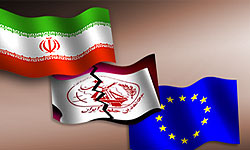 TEHRAN (FNA)- The European Union decided Monday to remove the anti-Iran terrorist group, the Mojahedin-e Khalq Organization (MKO), from its blacklist, a move which caused angry demonstrators to pour to the streets in Tehran.
TEHRAN (FNA)- The European Union decided Monday to remove the anti-Iran terrorist group, the Mojahedin-e Khalq Organization (MKO), from its blacklist, a move which caused angry demonstrators to pour to the streets in Tehran.
The 27- nation bloc’s foreign ministers, meeting in Brussels, decided to drop MKO from the blacklist. The MKO had been blacklisted as a terror organization by the EU since 2002.
The decision come as hundreds of Iranians demonstrated in front of the French embassy to voice strong protest against the European Union’s decision.
The angry protesters carried some placards reading some mottoes like, “We oppose striking the name of Monafeqin (the Hypocrites, as MKO is referred to in Iran) off the blacklist” and “Death to Monafeqin”.
The decision by the bloc’s foreign ministers means that as of Tuesday, the assets of the anti-Iran group will be unfrozen, a move likely to further damage relations strained over Tehran’s nuclear program.
“What we are doing today is abiding by the decision of the court, there is nothing we can do about the decision,” said Javier Solana, the EU’s foreign policy chief.
Earlier, In Tehran on Sunday Iran’s foreign ministry lashed out at the EU stance.
“The record of the actions of hypocrites (MKO) is very serious and if the EU decides to remove them from their list of terrorist groups, it will be considered a conscious political decision,” the ministry announced in a statement issued prior to the EU decision.
The MKO, whose main stronghold is in Iraq, is blacklisted by much of the international community, including the United States.
The MKO is behind a slew of assassinations and bombings inside Iran, a number of EU parliamentarians said in a letter last year in which they slammed a British court decision to remove the MKO from the British terror list. The EU officials also added that the group has no public support within Iran because of their role in helping Saddam Hussein in the Iraqi imposed war on Iran (1980-1988).
Many of the MKO members abandoned the terrorist organization while most of those still remaining in the camp are said to be willing to quit but are under pressure and torture not to do so.
A May 2005 Human Rights Watch report accused the MKO of running prison camps in Iraq and committing human rights violations.
According to the Human Rights Watch report, the outlawed group puts defectors under torture and jail terms.
The group, founded in the 1960s, blended elements of Islamism and Stalinism and participated in the overthrow of the US-backed Shah of Iran in 1979. Ahead of the revolution, the MKO conducted attacks and assassinations against both Iranian and Western targets.
The group started assassination of the citizens and officials after the revolution in a bid to take control of the newly established Islamic Republic. It killed several of Iran’s new leaders in the early years after the revolution, including the then President, Mohammad Ali Rajayee, Prime Minister, Mohammad Javad Bahonar and the Judiciary Chief, Mohammad Hossein Beheshti who were killed in bomb attacks by MKO members in 1981.
The group fled to Iraq in 1986, where it was protected by Saddam Hussein and where it helped the Iraqi dictator suppress Shiite and Kurd uprisings in the country.
The terrorist group joined Saddam’s army during the Iraqi imposed war on Iran (1980-1988) and helped Saddam and killed thousands of Iranian civilians and soldiers during the US-backed Iraqi imposed war on Iran.
Since the 2003 US invasion of Iraq, the group, which now adheres to a pro-free-market philosophy, has been strongly backed by neo-conservatives in the United States, who also argue for the MKO to be taken off the US terror list.
 Eurasia Press & News
Eurasia Press & News
